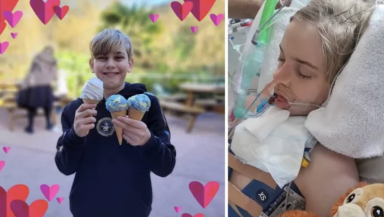
The Royal London Hospital, in East London, claims that 12-year-old Archie Battersbee, found unconscious with a ligature over his head some three months ago, is 'brain dead', and that it is therefore in his "best interests" to die.
No one disputes that Archie has suffered traumatic brain injury, from which admittedly he may not fully recover. But Archie's parents question the assessment of the doctors that he is brain stem dead and that there is, therefore, no hope of recovery.
They argue that Archie's heart is still beating, making it inappropriate to discontinue life support – which of course includes the provision of hydration and food, and without which no one can survive.
But the question is: are the doctors, who have written off Archie's chances of survival, right? And, even if they are, is the course of action they propose justified?
Hollie Dance, Archie's mother, says that when she talks to her son, she sometimes feels him squeeze her hand. She's convinced that, given time, he still has a chance of recovery.
In an interview to the BBC, she said, "He's in there, physically, for whatever reason, whether it's locked-in syndrome, whether he's paralysed ... I don't know, but I feel he's in there."
Is she delusional? Clinging to forlorn hope? After all, medics are absolutely clear that if someone is brain dead they can't possibly survive without artificial support, and that there really is no hope of recovery. For a lot of cases, that's probably true – albeit a difficult decision to make.
But it would seem that Archie's heart is still beating, independent of ventilation. And after only 13 weeks in a coma, that in itself surely gives grounds for hope?
By way of example, consider the case of Trenton McKinley, who was 13 when, in 2018, he was declared brain dead after suffering seven skull fractures in a dune buggy accident in Alabama.
Once again, told by doctors that the teenager had no chance of recovery, his grieving parents signed the papers that would allow his organs to be removed for donation – knowing that's what Trenton would have wanted – and then prepared themselves for the inevitable when the ventilator keeping him alive was turned off.
But the inevitable never happened. Instead, just as the doctors were about to turn off the machines, Trenton began to exhibit signs of mental activity and cognition, and so began his journey to recovery, albeit requiring ongoing medical treatment, including surgery to rebuild his skull.
Interestingly, speaking of the accident afterwards, Trenton said he could not remember how he ended up in hospital, but he did remember being in heaven, walking in a field, and he credited his recovery 100 per cent to God!
The truth is, there have been many such well-chronicled cases of patients unexpectedly regaining consciousness, even after years spent in a coma, so Hollie is perhaps well justified in her hope - especially given that Archie hasn't been unconscious for years, or even months, but was discovered unresponsive by his mother only in April.
Hardly a month later, at precisely noon on 31May, and following an MRI scan, the team responsible for his care pronounced him brain dead, on the strength of which they said that all life support treatment should be stopped immediately because in practice they were now ventilating a dead body.
But his mother – bravely, one might think – has disputed this verdict. The decision was taken too quickly, Hollie says, and Archie needs to be given time. At the very least, nature should be allowed to take its course.
In a moving statement, she said, "That little boy is fighting ... He cannot talk, he is unconscious. I am his voice. I am going to fight for him until Archie decides I can stop fighting."
One has both sympathy and admiration for her courage. The case indeed seems similar to that of 23-month-old Alfie Evans, whose life support was for similar reasons turned off in 2018. The hospital – Alder Hey Children's Hospital on this occasion – said that prolonging treatment was futile because Alfie couldn't recover.
What was really unconscionable, however, was the action subsequently taken to block the toddler's transfer to a hospital in Rome that had offered to continue his care.
Commenting on the decision at the time, Professor Dominic Wilkinson, neonatologist and Oxford professor, said, "Sometimes, the sad fact is that parents do not know what is best for their child ... "
Really? These decisions must always be difficult – and one sympathises with the doctors as well as the patients – but can it ever be justified for the State to assume such officious control, denying parents not just the exercise of their rights, but their responsibility to safeguard and protect their children from harm?
Parents are not simply breeding machines to birth workers for the continuance of society, and of course they will fight to protect what they see as the best interests of their child. Yes, they may sometimes be wrong and their attempts may ultimately prove futile, but their beliefs and views should be respected.
For all of us, but perhaps most especially when it is a child's life that is at stake, we do not have the right to decide who shall and shall not live, and when it is time to die.
This is yet a further and frightening manifestation of the emergence of a totalitarian tendency, and it must be resisted by all who value freedom and uphold the right to choose for ourselves the lives we would live, without interference or control.
Rev Lynda Rose is founder of Voice for Justice UK, a group which works to uphold the moral values of the Bible in society.













